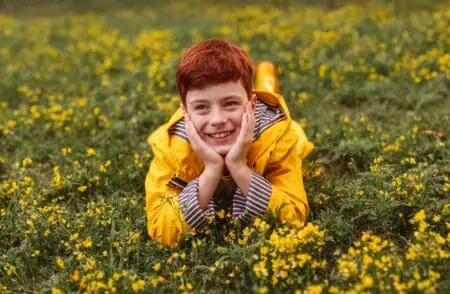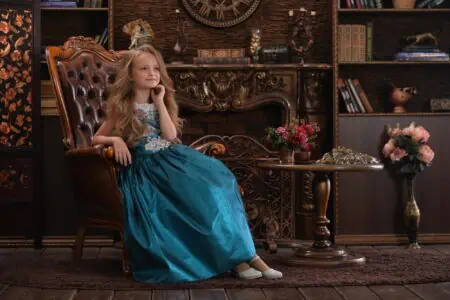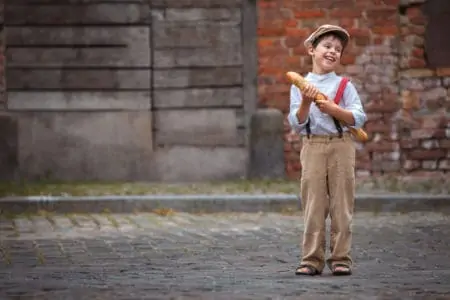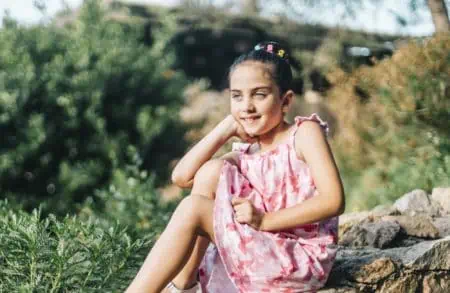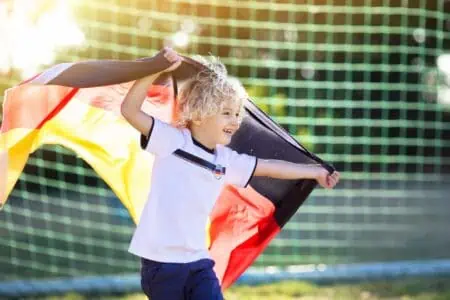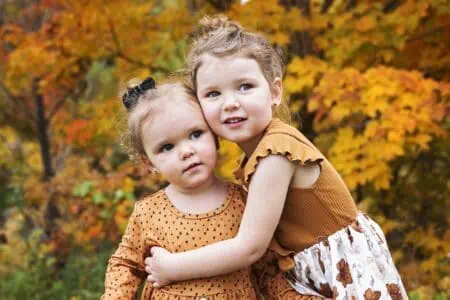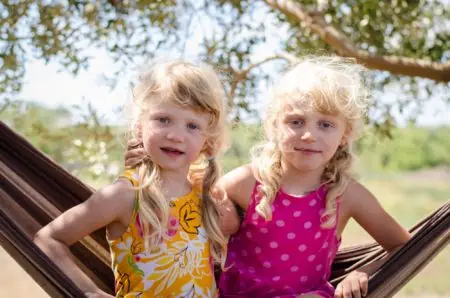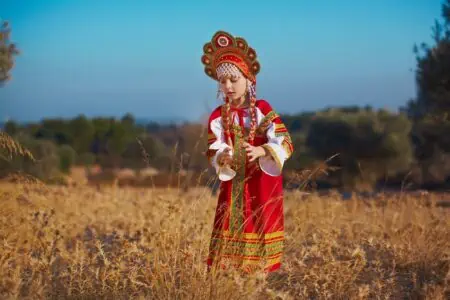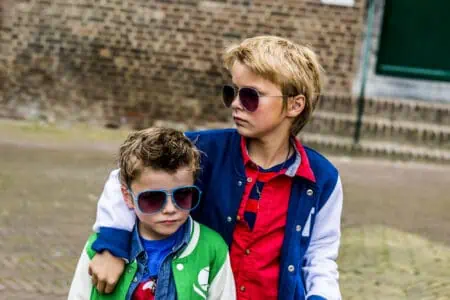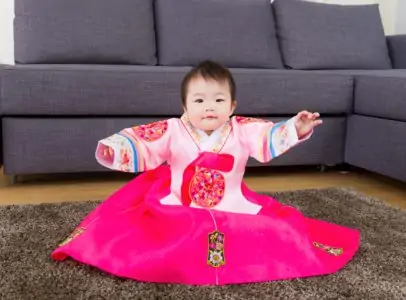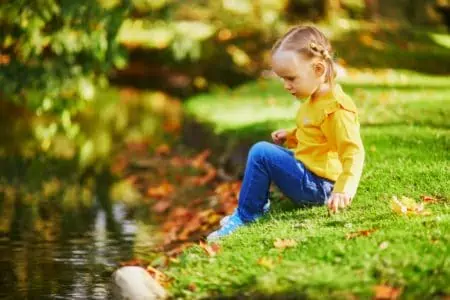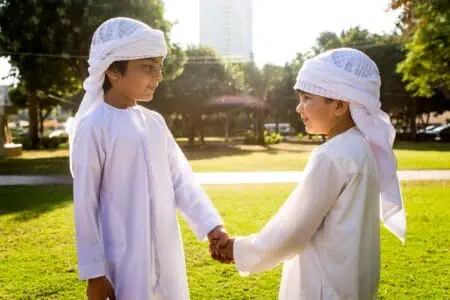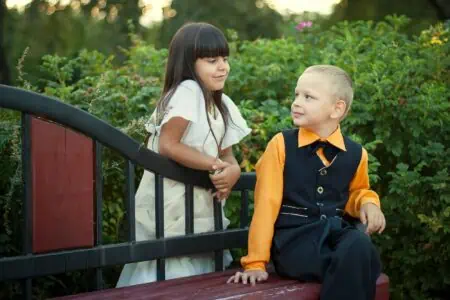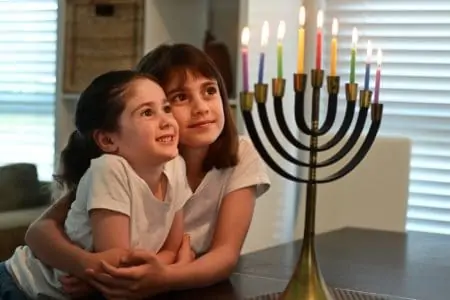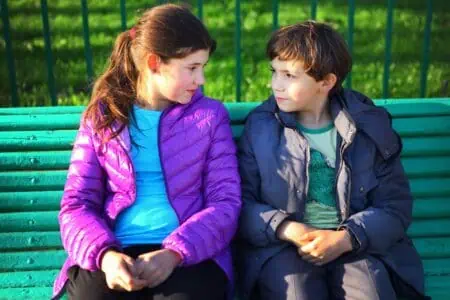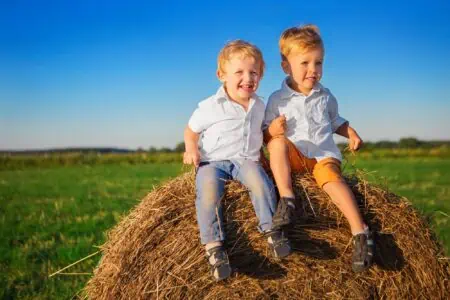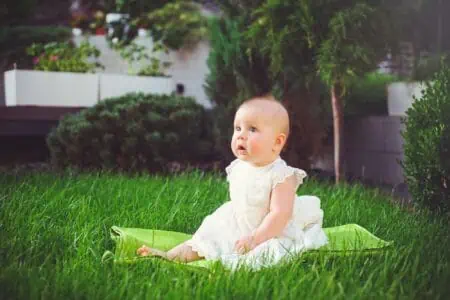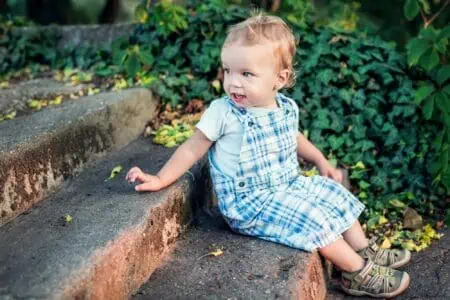Who can resist a journey to the land of romantic castles, bagpipers, and tales of the Loch Ness monster? Scottish last names are just as varied as the highlands and lowlands of the Scottish countryside. They’re not as easy to traverse, with influences ranging from French and Gaelic to Scandinavian.
Head for the hills with our guide to interesting Scottish surnames you’ll be fascinated by. While discovering their meanings, origin, and famous namesakes, you’ll become an expert in all things Scottish in no time!
100 Popular Scottish Surnames
Read some of the best folk tales behind many of the cool Scottish surnames that follow.
Abercrombie
Abercrombie originated as a Scottish place name in Fife, first called Abarcrumbach. It means “confluence of rivers at a bend,” but Abercrombie is best known for the American retailer Abercrombie and Fitch.
- Origin: Scottish
- Meaning: Mouth of the bendy river
- Pronunciation: Aeh-behr-KROM-biy
- Variations: Abercrombi
- Namesakes: Gordon Abercrombie, an Australian rugby league footballer for Cronulla-Sutherland. Joe Abercrombie, a British fantasy writer who won the 2015 Locus Award.
- Popularity: Abercrombie is rare worldwide and mostly used in Scotland, where it ranked 1,471st in 2014.
Addison
Addison is one of many Scottish last names based on an ancestor, “the son of Addie.” Addie was a Scottish Lowland nickname for Adam, also based on the Middle English Ade.
- Origin: Scottish, English
- Meaning: Son of Addie
- Pronunciation: AA-dihs-Son
- Variations: Addeson
- Namesakes: Karen Addison, a Scottish curler and silver medalist in the 2007 European Curling Championships. Anita W. Addison, an American producer at Warner Bros. Television.
- Popularity: Addison is rare worldwide, mainly used in the U.S., and ranked 727th in Scotland in 2014.
Ainsley
As a Scottish surname, Ainsley means “of Annesley,” located near Nottingham. It’s associated with the Old English “anne,” meaning “solitary,” and “leah,” meaning “woodland clearing.”
- Origin: Scottish, English
- Meaning: One’s own meadow
- Pronunciation: EYN-Zliy
- Variations: Ansleigh, Ainslie
- Namesakes: Jack Ainsley, an English footballer for Felixstowe & Walton United. William Ainsley, an English member of Parliament from 1955 to 1964.
- Popularity: Ainsley is very rare worldwide and primarily used in England.
Aitken
Aitken denotes a “son of Adam” as a medieval variation of Adam. Adam itself is based on the Hebrew “adama,” meaning earth.
- Origin: Scottish
- Meaning: Son of Adam
- Pronunciation: AEYT-kihn
- Variations: Aiken
- Namesakes: Brad Aitken, a Canadian ice hockey player for the Edmonton Oilers. Edward Hamilton Aitken, a Scottish writer and member of the Bombay Natural History Society.
- Popularity: Aitken is rare worldwide, primarily used in Australia, and ranked 94th in Scotland in 2014.
Anderson
Anderson originated as a name given to “the son of Andrew.” It first appeared in the 14th-century as “Fitz Andreu” and grew from Andrewson to the Anderson we recognize today.
- Origin: Scottish, English
- Meaning: Son of Andrew
- Pronunciation: ANN-dehr-Son
- Variations: Andersonne, Andersoun
- Namesakes: Gillian Anderson, an American-British actress known for The X-Files series. Rona Anderson, a Scottish actress appearing in Scrooge (1951).
- Popularity: Anderson ranked 367th worldwide, is mainly used in the U.S., and ranked 8th in Scotland in 2014.
Barclay
Barclay is a surname for those living in the Scottish locale “of Berkeley,” located in Gloucestershire. Like other Scottish surnames, Barclay has French origin and is made up of “beau,” meaning “beautiful,” and “leah,” meaning “meadow.”
- Origin: Scottish
- Meaning: Birch tree meadow
- Pronunciation: BAARK-Ley
- Variations: Barclaye
- Namesakes: Malcolm Barclay-Harvey, the Governor of South Australia from 1939 to 1944. Paul Barclay, an Australian radio presenter for the Australian Broadcasting Corporation.
- Popularity: Barclay is rare worldwide, primarily used in the U.S., and ranked 160th in Scotland in 2014.
Beattie
Beattie means “one who held land on condition of supplying food to those billeted on him by the chief.” It’s taken from the Gaelic “betagh,” meaning “public victualler (or landlord).”
- Origin: Scottish
- Meaning: Public house landlord
- Pronunciation: BEE-tiy
- Variations: Beatty
- Namesakes: Craig Beattie, a Scottish footballer for Swansea City. Joseph Beattie, an English actor known for Mansfield Park (2007).
- Popularity: Beattie is rare worldwide, mostly used in the U.S., and ranked 143rd in Scotland in 2014.
Beaufort
Beaufort is composed of the Old French “beau,” meaning “beautiful,” and “fort,” meaning “strong.” It traveled to Scotland from the French town of Le Beaufort.
- Origin: Scottish, French
- Meaning: Beautiful fort
- Pronunciation: BOW-Faort
- Variations: de Beaufort
- Namesakes: Jacques Antoine Beaufort, an 18th-century French painter known for Oath of Brutus to Avenge Lucretia (1771).
- Popularity: Beaufort is very rare worldwide and mainly used in France.
Bell
Belle comes from the Old French “beu,” meaning “handsome,” and is a patronymic name for “the son of Bell.” It’s linked to Le Bel, a surname based in Normandy.
- Origin: Scottish
- Meaning: Handsome
- Pronunciation: BEALL
- Variations: Belle
- Namesakes: Alexander Graham Bell, a Scottish-American inventor of the telephone who co-founded AT&T in 1885. David Bell, a Scottish producer at London Weekend Television.
- Popularity: Bell ranked 874th worldwide, is primarily used in the U.S., and ranked 37th in Scotland in 2014.
Blackwood
There are many place names in Scotland and England called Blackwood, in Dumfriesshire and Yorkshire. The oldest example of Blackwood appeared with William de Blackwood in Stirlingshire in 1327.
- Origin: Scottish
- Meaning: Blackwood
- Pronunciation: BLAEK-Wuud
- Variations: Blackwode
- Namesakes: Nina Blackwood, one of the American original MTV VJs. William Blackwood, a Scottish publisher who founded William Blackwood and Sons.
- Popularity: Blackwood is rare worldwide, mostly used in the U.S., and ranked 606th in Scotland in 2014.
Blair
Blair is the name of various Scottish place names and is composed of the Gaelic “blàr,” meaning “plain” or “battlefield.” It first appeared in the village of Blair, in Ayrshire.
- Origin: Scottish
- Meaning: Battlefield
- Pronunciation: BLEHR
- Variations: Blaire, Blaer
- Namesakes: Tony Blair, the Prime Minister of the UK from 1997 to 2007. Andrew Blair, a Scottish footballer for Aston Villa.
- Popularity: Blair is rare worldwide, mainly used in the U.S., and ranked 126th in Scotland in 2014.
Boice
Boyce originated as the French “del Bois,” based on the French “bois,” meaning “wood” and “grove.” It’s part of many locations in France known for their woodsy environments.
- Origin: Scottish
- Meaning: Grove
- Pronunciation: BOIYS
- Variations: Boyce, Boyse
- Namesakes: Griffin Boice, an American record producer known for working with the Black Eyed Peas. James Boice, an American writer known for MVP (2007).
- Popularity: Boice is very rare worldwide and primarily used in the U.S.
Bowie
Bowie was first the Gaelic nickname “buidhe,” meaning “yellow” or “fair-haired.” It derives from the Gaelic Ó’Buadhaigh, also meaning “descendant of Buadhach.”
- Origin: Scottish
- Meaning: Yellow
- Pronunciation: BOW-iy
- Namesakes: David Bowie, an English musician and winner of six Grammy Awards and four Brit Awards. Anthony Bowie, an American basketball player with the Orlando Magic.
- Popularity: Bowie is rare worldwide, mostly used in the U.S., and ranked 490th in Scotland in 2014.
Bowles
Bowles is an occupational name for a bowl maker based on the Old English “bolla.” When taken from the Old French “boelle,” it refers to an “agricultural enclosure.”
- Origin: Scottish, French
- Meaning: Bowl maker
- Pronunciation: BOUWLS
- Variations: Bolles, Bowls
- Namesakes: Camilla Parker Bowles, Queen of the UK and the wife of King Charles III. Lynn Bowles, a British broadcast reporter for BBC Radio 2.
- Popularity: Bowles is rare worldwide, mainly used in the U.S., and ranked 767th in Wales in 2014.
Breckenridge
Breckenridge is an Anglo variation of the original Scottish Brackenrig. It’s made up of the Middle English “breken,” meaning “bracken,” and “rigg,” meaning “ridge.”
- Origin: Scottish, English
- Meaning: Bracken-covered ridge
- Pronunciation: BREH-ken-Rihgh
- Variations: Breakenridge
- Namesakes: Beverly Breckenridge, a Canadian bass player for the band Fifth Column. John C. Breckinridge, the Vice President of the U.S. from 1857 to 1861.
- Popularity: Breckenridge is rare worldwide and primarily used in the U.S.
Brodie
Brodie is a Gaelic word also meaning “brow,” “ditch,” or “mire.” It’s associated with Brodie Castle in Moray, Scotland, and means “second son” as well.
- Origin: Scottish
- Meaning: Little ridge
- Pronunciation: BROW-Diy
- Variations: Brody, Brodee
- Namesakes: Malcolm Brodie, a Scottish journalist for the Belfast Telegraph. Malcolm Brodie, the mayor of Richmond, British Columbia, since 2001.
- Popularity: Brodie is rare worldwide, primarily used in the U.S., and ranked 382nd in Scotland in 2014.
Brown
Other than meaning “the son of Brun,” Brown was a surname for someone with “brown hair” or “brown eyes.” It’s also linked to the Old English “brun,” for “brown” itself.
- Origin: Scottish, English
- Meaning: Son of Brun
- Pronunciation: BRAUWN
- Variations: Browne
- Namesakes: John Campbell Brown, the Astronomer Royal for Scotland awarded the Gold Medal of the Royal Astronomical Society in 2012. Alton Brown, an American food show host of Good Eats.
- Popularity: Brown ranked 206th worldwide, is mainly used in the U.S., and ranked 2nd in Scotland in 2014.
Buchanan
Buchanan comes from the Gaelic “buth chanain,” meaning “house of the canon.” Like other Scottish family names, Buchanan’s meanings also include a parish in Stirlingshire.
- Origin: Scottish
- Meaning: House of the Cannon
- Pronunciation: Byuw-KAEN-nahn
- Namesakes: James Buchanan, an American economist awarded the Nobel Memorial Prize in Economic Sciences in 1986. Edna Buchanan, an American writer who won the 1986 Pulitzer Prize.
- Popularity: Buchanan is rare worldwide, primarily used in the U.S., and ranked 122nd in Scotland in 2014.
Calhoun
Calhoun is based on the Gaelic Colquhoun, meaning “from the narrow woods.” It’s a place name located in Aberdeenshire that’s made up of the Gaelic “còil,” meaning “nook” or “corner.”
- Origin: Scottish, Irish
- Meaning: From the narrow woods
- Pronunciation: Kael-HHUWN
- Variations: Calhoon, Callhoun
- Namesakes: Floride Calhoun, the Second Lady of the U.S. from 1825 to 1832. Rory Calhoun, an American actor known for How to Marry a Millionaire (1953).
- Popularity: Calhoun is rare worldwide and primarily used in the U.S., ranking 759th in 2014.
Cameron
Cameron is rooted in the Gaelic “cam,” meaning “crooked” or “bent,” and “sròn,” meaning “nose” or “abhainn,” meaning “river.” Cameron is in Lennox, near Fife, and inspired this topographically based name.
- Origin: Scottish
- Meaning: Crooked river
- Pronunciation: KAEM-ah-Rahn
- Variations: Camaeron, Camaron
- Namesakes: Kirk Cameron, an American actor known for the sitcom Growing Pains (1985 to 1992). James Cameron, a Canadian filmmaker known for the Avatar film series.
- Popularity: Cameron is rare worldwide, mainly used in the U.S., and ranked 31st in Scotland in 2014.
Campbell
Campbell derives from the Gaelic “caimbeul,” meaning “wry (or crooked) mouth.” The ancient Campbell clan was the most badass of the Highland clans in Scotland.
- Origin: Scottish
- Meaning: Crooked mouth
- Pronunciation: KAEM-Bahl
- Variations: Cambell, Campbeul
- Namesakes: Joseph Campbell, an American writer known for The Hero with a Thousand Faces (1949). Bruce Campbell, an American actor known for the Evil Dead horror franchise.
- Popularity: Campbell ranked 657th worldwide, is primarily used in the U.S., and ranked 4th in Scotland in 2014.
Cawley
Cawley was born from the Gaelic MacAmhalghaidh, or the alternative MacAmhlaibh, meaning “son of Amlaib.” It can mean “son of Auley,” “son of Auliffe,” or “son of Humphrey.”
- Origin: Scottish
- Meaning: Son of Auley
- Pronunciation: KAO-Liy
- Variations: Cawleigh, Cawlie
- Namesakes: William Cawley, an English boxer and the 2016 ABA flyweight champion. James Cawley, an American actor known for the fan film series Star Trek: Phase II.
- Popularity: Cawley is rare worldwide, mostly used in the U.S., and ranked 560th in Ireland in 2014.
Corbett
Corbett is associated with the Old French “corbeau” and Latin “corvus,” meaning “raven.” It’s more typical as a nickname for someone with dark hair or a dark complexion.
- Origin: Scottish
- Meaning: Raven-like
- Pronunciation: KAOR-Beht
- Variations: Corbet
- Namesakes: John Corbett, an American actor known for My Big Fat Greek Wedding (2002). Ronnie Corbett, a Scottish actor known for the BBC sketch show The Two Ronnies.
- Popularity: Corbett is rare worldwide, mainly used in the U.S., and ranked 590th in Scotland in 2014.
Cowan
Cowan is a shorter variation of the Celtic MacEoghain, meaning “son of Eoghan.” It means “dweller at a hollow” and was an occupational name for a metalworker.
- Origin: Scottish
- Meaning: Hollow in the hill
- Pronunciation: Kow-waan
- Variations: Cowyn
- Namesakes: Edith Cowan, the first Australian woman to serve as a member of parliament from 1921 to 1924. Barry Cowan, a Northern Irish journalist with BBC Northern Ireland.
- Popularity: Cowan is rare worldwide, primarily used in the U.S., and ranked 144th in Scotland in 2014.
Craig
Craig is taken from the Middle English “creag,” meaning “rocky hill.” It indicated someone living “at or near the craig” to tell us there’s a hill full of rocks nearby.
- Origin: Scottish
- Meaning: Rocky hill
- Pronunciation: KRAEG
- Variations: Craige, Craigg
- Namesakes: Daniel Craig, an English actor known for the James Bond film series. Neil Craig, an Australian rules footballer for the North Adelaide Football Club.
- Popularity: Craig is uncommon worldwide, mostly used in the U.S., and ranked 59th in Scotland in 2014.
Cruickshank
Cruickshank may sound mythical, but it simply refers to a “dweller at the crooked projecting point of a hill.” It’s most inspired by the River Cruick in Kincardineshire.
- Origin: Scottish
- Meaning: Crooked point
- Pronunciation: CRUWK-Shahnk
- Variations: Cruikshank
- Namesakes: Holly Cruikshank, an American dancer appearing in the musical Movin’ Out. Sarah Cruikshank, an American cartoonist for Sesame Street.
- Popularity: Cruickshank is rare worldwide and mainly used in Scotland, where it ranked 265th in 2014.
Cumming
Cumming originated as Comyn, similar to the town of Comines in France. It’s also associated with the Celtic root “cam,” meaning “bent” or “crooked.”
- Origin: Scottish, French
- Meaning: From Comines
- Pronunciation: KUH-mihng
- Variations: Cummings
- Namesakes: Alan Cumming, a Scottish actor awarded the 1991 Laurence Olivier Award for Best Comedy Performance. Charles Cumming, a British writer known for The Spanish Game (2006).
- Popularity: Cumming is rare worldwide, primarily used in Australia, and ranked 250th in Scotland in 2014.
Cunningham
Cunningham dates back to the 12th-century Cunegan, made up of the Gaelic “cunny,” meaning “rabbit” and “hame,” meaning “home.” It was used for those from Cunningham in North Ayrshire.
- Origin: Scottish
- Meaning: Rabbit’s home
- Pronunciation: KUH-nihg-Hhaem
- Variations: Cuningham
- Namesakes: Gordon Cunningham, a Scottish golfer who won the 1969 Scottish Professional Championship. Phil Cunningham, a Scottish folk musician with the group Silly Wizard.
- Popularity: Cunningham is uncommon worldwide, mostly used in the U.S., and ranked 71st in Scotland in 2014.
Docherty
Doherty is the uniquely Scottish form of the Irish Doherty based on O’Dochartaigh, meaning “descendant of Dochartach.” It means “difficulty,” “hurtful,” or “hardship.”
- Origin: Scottish, Irish
- Meaning: Unlucky
- Pronunciation: DAA-ker-Tiy
- Variations: Doherty
- Namesakes: Craig Docherty, a Scottish boxer who held the Commonwealth super-featherweight title from 2003 to 2005. Nicola Dochert, a Scottish footballer for the Rangers.
- Popularity: Docherty is rare worldwide and mainly used in Scotland, ranking 80th in 2014.
Donne
Donne comes from the Old Gaelic “donn” and Old English “dunn,” meaning “dark” or “dull brown.” It was a nickname for those with dark hair or a darker complexion.
- Origin: Scottish, French
- Meaning: Brown
- Pronunciation: DUHN
- Variations: Dunn, Dunne
- Namesakes: John Donne, a 16th-century English poet known for the genre of metaphysical poetry. Gaven Donne, a New Zealand Chief Justice and the 1st Queen’s Representative to the Cook Islands from 1982 to 1984.
- Popularity: Donne is rare worldwide, primarily used in France, and ranked 1,780th in Wales in 2014.
Douglas
Douglas is taken from the Scottish-Gaelic “dubh glas,” meaning “black stream” or dark river.” It was also used for someone from Douglas in Lanarkshire.
- Origin: Scottish, English
- Meaning: Black stream
- Pronunciation: DAHG-Lahs
- Variations: Douglass
- Namesakes: James Douglas, the first Governor of the Colony of British Columbia from 1858 to 1864. Illeana Douglas, an American actress appearing on the series Six Feet Under.
- Popularity: Douglas is uncommon worldwide, primarily used in the U.S., and ranked 81st in Scotland in 2014.
Doyle
Doyle is linked to many Norman-influenced Scottish last names and means “de Oilgi” or “de Ouilli,” in Normandy. It’s based on the Gaelic Ó’Dubhghaill, meaning “descendant of Dubhghall,” referring to a “dark stranger.”
- Origin: Scottish
- Meaning: Dark stranger
- Pronunciation: DOYL
- Variations: Doyel, Doyl
- Namesakes: Arthur Conan Doyle, an English writer and creator of Sherlock Holmes in 1887. Candida Doyle, an Irish keyboard player with the band Pulp.
- Popularity: Doyle is uncommon worldwide, mainly used in the U.S., and ranked 324th in Scotland in 2014.
Drummond
Drummond represents an almost royal surname on the list and was first given to a barony of Drummond. It’s associated with the Gaelic “drumainn,” from “druim,” meaning “ridge.”
- Origin: Scottish
- Meaning: Ridge
- Pronunciation: DRUH-Mahnd
- Variations: Drumand, Drummund
- Namesakes: Ree Drummond, an American food TV personality ranking 22nd on Forbes’ Top 25 Web Celebrities. Ross Drummond, a Scottish golfer featured in the book Four Iron in the Soul.
- Popularity: Drummond is rare worldwide, primarily used in the U.S., and ranked 192nd in Scotland in 2014.
Duffy
Duffy is a nickname for someone with a “dark complexion,” originating as Ó’Dubhthaigh. Duffy is also a 6th-century saint who became the archbishop of Armagh.
- Origin: Scottish, Irish
- Meaning: Dark one
- Pronunciation: DUHF-iy
- Variations: Duffey
- Namesakes: Carol Ann Duffy, a Scottish poet appointed Poet Laureate in May 2009. Neil Duffy, a Scottish footballer for Dundee United.
- Popularity: Duffy is rare worldwide, mostly used in the U.S., and ranked 142nd in Scotland in 2014.
Dunbar
Dunbar is a place name located near Edinburgh and the North Sea. It’s composed of the Gaelic “dùn,” meaning “fort,” and “barr,” meaning “top,” to describe a military stronghold.
- Origin: Scottish
- Meaning: Summit fort
- Pronunciation: DUHN-Baar
- Variations: Dunbarr
- Namesakes: Adrian Dunbar, an Irish actor known for the series Line of Duty (2012 to 2021). Karen Dunbar, a Scottish comedian appearing on The Karen Dunbar Show (2003 to 2006).
- Popularity: Dunbar is rare worldwide, mainly used in the U.S., and ranked 404th in Scotland in 2014.
Duncan
Duncan was regularly used for “the son of Duncan,” originating from the Gaelic Donncheann. It’s made up of “donn,” meaning “brown-haired man,” and “ceann,” meaning “chief.”
- Origin: Scottish
- Meaning: Noble chief
- Pronunciation: DUHN-Kahn
- Variations: Dunckan
- Namesakes: Sandy Duncan, an American actress known for The Hogan Family sitcom. Malcolm Duncan, a Scottish member of the Average White Band.
- Popularity: Duncan ranked 1,916th worldwide, is primarily used in the U.S., and ranked 32nd in Scotland in 2014.
Fairbairn
Fairbairn was first a nickname for a “fair child” and originated near Yorkshire. The Gaelic “fair bairn” has Old English roots that have also come to mean “beautiful child.”
- Origin: Scottish
- Meaning: Handsome child
- Pronunciation: FEHR-Bern
- Variations: Faerbairn, Fairbaern
- Namesakes: Nicholas Fairbairn, the Solicitor General for Scotland from 1979 to 1982. Bill Fairbairn, a Canadian ice hockey player with the New York Rangers.
- Popularity: Fairbairn is rare worldwide, mostly used in England, and ranked 760th in Scotland in 2014.
Faulkner
Faulkner was first an occupational name for “the falconer,” particularly someone who cared for a noble house’s falcons. It’s composed of the Old French “fau(l)connier,” also meaning “falconer.”
- Origin: Scottish
- Meaning: Falconer
- Pronunciation: FAAOWK-ner
- Variations: Falkner
- Namesakes: William Faulkner, an American writer awarded the 1949 Nobel Prize in Literature. Max Faulkner, an English golfer who won the 1951 Open Championship.
- Popularity: Faulkner is rare worldwide, mainly used in the U.S., and ranked 1,432nd in Scotland in 2014.
Ferguson
Ferguson denotes the “son of Fergus,” which appeared as Fearghas. It’s been known to mean “son of the angry (one)” for a particularly mad Fergus.
- Origin: Scottish
- Meaning: Son of Fergus
- Pronunciation: FEHR-gaa-Sahn
- Variations: Fergusson
- Namesakes: Craig Ferguson, a Scottish-American comedian who hosted The Late Late Show with Craig Ferguson from 2005 to 2014. Andy Ferguson, a Scottish footballer for Arthurlie F.C.
- Popularity: Ferguson ranked 1,744th worldwide, is primarily used in the U.S., and ranked 34th in Scotland in 2019.
Findlay
Findlay is an Anglo form of the Gaelic Fionnlagh. It’s composed of “fionn,” meaning “fair,” and “lagh,” meaning “hero.” It may relate to Finn, the greatest hero in Celtic mythology.
- Origin: Scottish
- Meaning: Fair hero
- Pronunciation: FIHND-Laey
- Variations: Finlay, Findley
- Namesakes: Mary Lou Finlay, a Canadian journalist who hosted the program Finlay and Company. Virgil Finlay, an American horror illustrator inducted into the Science Fiction Hall of Fame in 2012.
- Popularity: Findlay is rare worldwide and mostly used in Scotland, where it ranked 108th in 2014.
Fletcher
- Origin: Scottish
- Meaning: Arrow maker
- Pronunciation: FLEH-Cher
- Variations: Flecher
- Namesakes: Darren Fletcher, a Scottish football technical director for Manchester United. Justin Fletcher, an English TV presenter on the program CBeebies.
- Popularity: Fletcher is uncommon worldwide, mainly used in the U.S., and ranked 427th in Scotland in 2014.
- Description: Fletcher is one of multiple Scottish surnames that start with F, which is based on an occupation. A “fletcher” makes or sells arrows and is based on the Old French “fleche,” meaning “arrow.”
Fraser
Fraser originally appeared as de Frisselle or de Fresel. It’s inspired by the French “frasere,” meaning “strawberry plant,” and was given to someone growing strawberries on their land.
- Origin: Scottish, French
- Meaning: Strawberry bearer
- Pronunciation: FRAEY-Sehr
- Variations: Fraeser, Fraiser
- Namesakes: Alasdair Fraser, a Scottish fiddler inducted into the Scottish Traditional Music Hall of Fame in 2011. Matthew Fraser, a British-Canadian journalist at The Globe and Mail.
- Popularity: Fraser is rare worldwide, primarily used in the U.S., and ranked 22nd in Scotland in 2014.
Gibson
Gibson is based on the personal name Gilbert, deriving from Giselbert or Gillebert. The short form became Gibb to indicate a “son of Gibb.”
- Origin: Scottish, English
- Meaning: Son of Gibb
- Pronunciation: GIHB-Sohn
- Variations: Gibbson
- Namesakes: Catherine Gibson, a Scottish swimmer and bronze medalist at the 1948 Summer Olympics. Jill Gibson, an American singer with the rock group the Mamas and the Papas.
- Popularity: Gibson ranked 1,341st worldwide, is primarily used in the U.S., and ranked 49th in Scotland in 2014.
Gifford
Gifford is based on Gifard, made up of the Germanic “geb,” meaning “give,” and “hard,” meaning “hardy.” It relates to the Old French “gif(f)ard,” meaning “chubby-cheeked” as a funny nickname.
- Origin: Scottish
- Meaning: Son of Giffard
- Pronunciation: GIYF-Faord
- Variations: Gifforde, Giffurd
- Namesakes: Frank Gifford, an American football commentator on ABC’s Monday Night Football. Sally Gifford, a Canadian actress who hosted the series The-X.
- Popularity: Gifford is rare worldwide, mainly used in the U.S., and ranked 1,912th in Scotland in 2014.
Glenn
The Glen(n) surname is among the oldest tough Scottish clan names. It’s based on “glean,” meaning “small valley,” and dates back to the 6th-century.
- Origin: Scottish
- Meaning: Small valley
- Pronunciation: GLEHN
- Variations: Glen
- Namesakes: Scott Glenn, an American actor known for The Silence of the Lambs (1991). John Glenn, an American astronaut and the first American to orbit the Earth in 1962.
- Popularity: Glenn is rare worldwide, primarily used in the U.S., and ranked 401st in Northern Ireland in 2014.
Gordon
Gordon first appeared in Berwickshire in Scotland and is composed of the Gaelic “gor,” meaning “large,” and “dun,” meaning “fort.” It originated in the 12th-century and is a popular Scottish boy’s name today.
- Origin: Scottish
- Meaning: Spacious fort
- Pronunciation: GAOR-Dahn
- Variations: Gordyn, Gordan
- Namesakes: Douglas Gordon, a Scottish artist awarded the Hugo Boss Prize in 1998. Hannah Gordon, a Scottish actress known for the series Upstairs, Downstairs (1974 to 1975).
- Popularity: Gordon ranked 1,364th worldwide, is primarily used in the U.S., and ranked 52nd in Scotland in 2014.
Haggan
Haggan is associated with the Gaelic surname Hogan, originating as the Gaelic Óh’Ágáin, meaning “descendant of Ógán.” It also means “noble” or “exalted son.”
- Origin: Scottish
- Meaning: Youthful
- Pronunciation: HHAE-Gahn
- Variations: Hagan
- Namesakes: Mario Haggan, an American football player for the Buffalo Bills. Alexander Haggan, an Irish cricketer for the Northern Knights.
- Popularity: Haggan is very rare worldwide, mainly used in the U.S., and ranked 1,161st in Northern Ireland in 2014.
Harrower
Harrower is occupation-based and refers to a person who “cultivated land.” It’s taken from the Middle English “harwere,” meaning a “maker of harrows.” A harrow is a farm implement used to till the soil.
- Origin: Scottish, English
- Meaning: One who harrows
- Pronunciation: HAE-row-Ehr
- Variations: Harower
- Namesakes: Kristi Harrower, an Australian basketball player and silver medalist at the 2008 Summer Olympics. Elizabeth Harrower, an Australian writer for The Sydney Morning Herald.
- Popularity: Harrower is very rare worldwide and primarily used in Scotland, ranking 1,016th in 2014.
Hendry
Hendry is a less pure way to denote “the son of Henry” and occurs in Ayrshire and Fife in Scotland. Hendry is associated with the Scottish Henderson clan originating in the 14th-century.
- Origin: Scottish
- Meaning: Son of Henry
- Pronunciation: HHEHN-Driy
- Variations: Hendrie
- Namesakes: Ian Hendry, a British actor appearing in The Avengers series. Drew Hendry, a Scottish member of Parliament since 2015.
- Popularity: Hendry is rare worldwide, mostly used in the U.S., and ranked 151st in Scotland in 2014.
Hewitt
Hewitt is a patronymic name for “the son of Hugh,” related to the Middle English Hew and Hughsomeone. Hewitt is often found in Northern England and is prevalent all around the UK.
- Origin: Scottish, English
- Meaning: Son of Hugh
- Pronunciation: HHYUW-iht
- Variations: Hewit
- Namesakes: James Hewitt, the Lord Chancellor of Ireland from 1767 to 1789. Don Hewitt, an American TV news producer who created 60 Minutes.
- Popularity: Hewitt is rare worldwide, mainly used in the U.S., and ranked 798th in Scotland in 2014.
Holmes
Holmes refers to a place “at the holm” upon “an inlet or flatland near a river.” It’s linked to Scottish places called Holmes in Ayrshire and Angus.
- Origin: Scottish
- Meaning: At the holm
- Pronunciation: HOHLMZ
- Variations: Holms
- Namesakes: Eric Holmes, a Scottish writer known for the miniseries The Transformers: Megatron Origin. Larry Holmes, an American boxer and the World Heavyweight Champion from 1978 to 1985.
- Popularity: Holmes ranked 1,725th worldwide, is primarily used in the U.S., and ranked 345th in Scotland in 2014.
Hunter
Hunter is one of the clearest examples of Scottish family names based on occupation. It was given to hunters when based on the Old English “huntian,” meaning “to hunt.”
- Origin: Scottish, English
- Meaning: One who hunts
- Pronunciation: HHUHNT-er
- Variations: Huntor
- Namesakes: Siobhan Hunter, a Scottish footballer for Hibernian. Tab Hunter, an American actor known for Damn Yankees (1958).
- Popularity: Hunter ranked 1,648th worldwide, is mostly used in the U.S., and ranked 35th in Scotland in 2014.
Hussey
Hussey is related to place names in France like Heusse and is a nickname for someone who “wears boots.” It originated with the Latin “hosatus,” meaning “booted” and ready for anything.
- Origin: Scottish, French
- Meaning: Booted
- Pronunciation: HUH-see
- Variations: Hussy
- Namesakes: Olivia Hussey, an English actress known for the 1968 film Romeo and Juliet/ Gemma Hussey, the Irish Leader of Fine Gael from 1981 to 1982.
- Popularity: Hussey is rare worldwide, mainly used in the U.S., and ranked 603rd in Ireland in 2014.
Irving
Irving is rooted in Irvine, located in Ayrshire and Dumfriesshire. Irving is most inspired by the River Irvine, meaning “green or fresh river.”
- Origin: Scottish, English
- Meaning: Green river
- Pronunciation: EHR-Vihng
- Variations: Irvine
- Namesakes: John Irving, an American-Canadian writer who won the 1999 Oscar for Best Adapted Screenplay for The Cider House Rules.
- Popularity: Irving is rare worldwide, primarily used in the U.S., and ranked 462nd in Scotland in 2014.
Kendrick
Kendrick has Welsh-Celtic origins as Cynwrig, meaning “greatest champion.” It uses the root “cyne,” meaning “royal,” and refers to “the son of Kenwrec.”
- Origin: Scottish
- Meaning: Royal ruler
- Pronunciation: KEHN-Drihk
- Variations: Kendric, Kendrik
- Namesakes: Fiona Kendrick, the English chairman of Nestlé UK & Ireland. Robert Kendrick, an American tennis player who peaked at 69th in 2009.
- Popularity: Kendrick is rare worldwide, mostly used in the U.S., and ranked 617th in Wales in 2014.
Kerr
Kerr comes from the Old Norse “kjarr,” meaning “copse” or “wet ground.” It also means “marsh dweller” and refers to a place “at the carr” with wet ground.
- Origin: Scottish, Scandinavian
- Meaning: Wet ground
- Pronunciation: KEHR
- Variations: Karr
- Namesakes: James Kerr, a Scottish singer for the rock band Simple Minds. Deborah Kerr, a British canoeist who competed at the 2020 Summer Olympics.
- Popularity: Kerr is rare worldwide, mainly used in the U.S., and ranked 33rd in Scotland in 2014.
Lamont
Lamont dates back to the 13th-century clan whose name derived from Lagman. It’s linked to the Old Norse Logmaðr, made up of “lag,” meaning “law,” and “maðr,” meaning “man.”
- Origin: Scottish, Scandinavian
- Meaning: Lawman
- Pronunciation: Laa-MAHNT
- Variations: Lamonte
- Namesakes: Johann Lamont, the Leader of the Scottish Labour Party from 2011 to 2014. Peter Lamont, a British production designer known for 18 James Bond films.
- Popularity: Lamont is rare worldwide, primarily used in the U.S., and ranked 344th in Scotland in 2014.
Lees
Lees is a location “at the lees.” It’s composed of the Middle English “lees,” meaning “fields,” and “lese,” meaning “pasture.”
- Origin: Scottish, English
- Meaning: At the lees
- Variations: MacLees
- Namesakes: Meg Lees, a member of the Australian Senate from 1990 to 2005. Robert Lees, an American screenwriter known for the Abbott and Costello films.
- Popularity: Lees is rare worldwide, mostly used in England, and ranked 410th in Scotland in 2014.
Lennox
Lennox points to a beautiful location “with many elm trees.” This “elm grove” place name was known as “the Lennox,” famous for its trees.
- Origin: Scottish
- Meaning: Elm grove
- Pronunciation: LEHN-ayks
- Variations: Lennix, Lenox
- Namesakes: Annie Lennox, a Scottish singer-songwriter and member of the band Eurythmics. Noah Lennox, an American member of the band Animal Collective.
- Popularity: Lennox is rare worldwide, mainly used in the U.S., and ranked 605th in England in 2014.
MacDougal
MacDougal derives from the Gaelic MacDhilghaill, meaning “son of Dougal.” The original clan was located in Dunollie, in the Scottish Highlands.
- Origin: Scottish
- Meaning: Son of Dougal
- Pronunciation: Mac-DUW-gaal
- Variations: MacDougall
- Popularity: MacDougal is very rare worldwide and mostly used in the U.S.
MacGill
McGill comes from the Gaelic Mac an Ghoill, meaning “son of the Lowlander or stranger.” It also ranked 1,218th for U.S. surnames in 2000.
- Origin: Scottish
- Meaning: Son of the stranger
- Pronunciation: Mac-GHIYL
- Variations: McGill, Magill
- Namesakes: Charles MacGill, an Australian cricketer for Western Australia. Patrick MacGill, an Irish journalist known as The Navvy Poet.
- Popularity: MacGill is very rare worldwide, mainly used in the U.S., and ranked 767th in Guernsey in 2014.
MacGowan
MacGowan first appeared as the Gaelic Mac a Ghobhainn, meaning “son of the smith.” It uses the Gaelic root “gabha,” meaning “son of the ironworker.”
- Origin: Scottish
- Meaning: Son of the smith
- Pronunciation: Mac-GOUW-aan
- Variations: McGowan
- Namesakes: Alice MacGowan, an American writer known for Two by Two (1922). Shane MacGowan, an Irish singer for the band the Pogues.
- Popularity: MacGowan is very rare worldwide and primarily used in the U.S.
MacLellan
MacLellan is an Anglo spelling for the Gaelic MacGille Fhaolain, meaning “son of the servant of (Saint) Faolán.” The root name Faolán comes from “faol,” meaning “little wolf.”
- Origin: Scottish
- Meaning: Son of the servant
- Pronunciation: Maa-KLEHL-ahn
- Variations: McLellan
- Namesakes: Brian MacLellan, a Canadian ice hockey general manager of the Washington Capitals. Geoffrey MacLellan, a Canadian member of the Nova Scotia House of Assembly from 2010 to 2021.
- Popularity: MacLellan is rare worldwide, primarily used in Canada, and ranked 926th in Scotland in 2014.
MacMillan
McMillian is based on the Gaelic MacMhaolain, meaning “son of the bald or tonsured one.” It uses the Gaelic given name Maolán, a diminutive of “maol,” meaning “bald.”
- Origin: Scottish
- Meaning: Son of the bald one
- Pronunciation: Mac-MIHL-ahn
- Variations: McMillan
- Namesakes: Alexander MacMillan, a co-founder of Macmillan Publishers, in 1843. Kenneth MacMillan, the British artistic director of the Royal Ballet from 1970 to 1977.
- Popularity: MacMillan is rare worldwide, mostly used in Canada, and ranked 264th in Scotland in 2014.
MacNally
MacNally is an English variation of the Gaelic Mac an Fhailghigh, meaning “son of the poor man.” It’s associated with the “son of Cú Allaidh,” meaning “wild hound” in Gaelic.
- Origin: Scottish
- Meaning: Son of the poor man
- Pronunciation: Mac-NAAL-iy
- Variations: McNally
- Popularity: MacNally is very rare worldwide and mainly used in Ireland, where it ranked 1,549th in 2014.
MacNee
MacNee is an Anglo form of the Gaelic Mac Neidhe, meaning “son of Niadh,” or “son of the champion.” Like other Scottish last names, it can appear as MacNee or McNee.
- Origin: Scottish
- Meaning: Son of the champion
- Pronunciation: Mac-NIY
- Variations: McNee
- Namesakes: Daniel MacNee, a Scottish painter and president of the Royal Scottish Academy in 1876. Patrick Macnee, an English actor known for the series The Avengers.
- Popularity: MacNee is very rare worldwide and primarily used in Scotland.
Mackenzie
Mackenzie began as the Gaelic MacCoinnich, meaning “son of Coinneach,” or “son of Kenneth.” It uses the root “cann,” meaning “fair” and “bright.”
- Origin: Scottish
- Meaning: Son of the fair bright one
- Pronunciation: Maa-KEHN-ziy
- Variations: MacKenzie, McKenzie
- Namesakes: Agnes MacKenzie, a Scottish TV host for the series How Clean Is Your House? (2003 to 2009). Alastair Mackenzie, a Scottish actor appearing in Monarch of the Glen.
- Popularity: Mackenzie is rare worldwide, mostly used in Canada, and ranked 42nd in Scotland in 2014.
McAdam
McAdam means “son of Adam,” which appears the same way it does in the Hebrew Bible. The original Scottish McAdam clan originated from the Gregor Clan.
- Origin: Scottish
- Meaning: Son of Adam
- Pronunciation: Mac-AH-dahm
- Variations: MacAdam
- Namesakes: Colin McAdam, a Scottish footballer for the Rangers. Colin McAdam, a Canadian novelist known for Some Great Thing (2004).
- Popularity: McAdam is rare worldwide, mainly used in the U.S., and ranked 585th in Scotland in 2014.
McCabe
McCabe means “son of the Abbot,” from the Gaelic Mac Cába, meaning “son of Cába.” It’s based on the Gaelic “caba,” meaning “hat” or “cap.”
- Origin: Scottish
- Meaning: Son of the abbot
- Pronunciation: Mac-KEYB
- Variations: MacCabe
- Namesakes: Cathal McCabe, a Northern Irish writer awarded the 2004 Strong Award for Poetry. Steve McCabe, an English member of Parliament since 2010.
- Popularity: McCabe is rare worldwide, primarily used in the U.S., and ranked 234th in Scotland in 2014.
McCoy
McCoy is related to the Irish McGee and McHugh, originating with the Gaelic Mac Aodha. It means “son of Aodh,” named after a Celtic mythical prince of fire.
- Origin: Scottish
- Meaning: The son of Aodh (fire)
- Pronunciation: Mac-COEY
- Variations: McCay
- Namesakes: Sylvester McCoy, a Scottish actor known for the series Doctor Who from 1987 to 1989. Jake McCoy, an American ice hockey player for the Minnesota Nationals.
- Popularity: McCoy is rare worldwide and mostly used in the U.S., ranking 260th in 2014.
McDonald
McDonald represents an Anglo spelling of the Gaelic MacDhòmhnaill, meaning “son of Dòmhnall.” Dòmhnall is made up of “domno,” meaning “world” and “val,” meaning “might.”
- Origin: Scottish
- Meaning: Son of Dòmhnall
- Pronunciation: Mac-DAWN-Uhld
- Variations: MacDonald
- Namesakes: Margo MacDonald, a Scottish member of Parliament from 1973 to 1974. Rory MacDonald, a Canadian mixed martial artist and Bellator Welterweight World Champion.
- Popularity: McDonald ranked 1,594th worldwide, is mainly used in the U.S., and ranked 30th in Scotland in 2014.
McFarlane
McFarlane originally appeared as the Gaelic Mac Pharlain, meaning “son of Parlan.” Parlan was taken from Parthalán, a Gaelic version of Bartholomew.
- Origin: Scottish
- Meaning: Son of Parland
- Pronunciation: Mak-FAAR-lahn
- Variations: McFarland, MacFarlane
- Namesakes: Ian McFarlane, an Australian music journalist known for the Encyclopedia of Australian Rock and Pop (1999). Norman McFarlane, the 64th Mayor of Saint John, New Brunswick, Canada, from 2004 to 2008.
- Popularity: McFarlane is rare worldwide, primarily used in the U.S., and ranked 110th in Scotland in 2014.
McGregor
McGregor comes from the Gaelic Mac Griogair, meaning “son of Griogar.” Griogar is the Gaelic variation of Gregory and is part of the McGregor clan first seen near Glasgow and Stirling.
- Origin: Scottish
- Meaning: Son of Gregory
- Pronunciation: Mak-GREH-ger
- Variations: MacGregor
- Namesakes: Ewan McGregor, a Scottish actor known for Trainspotting (1996). Allan McGregor, a Scottish footballer for Dunfermline Athletic.
- Popularity: McGregor is rare worldwide, primarily used in the U.S., and ranked 85th in Scotland in 2014.
McIntosh
McIntosh derives from the Gaelic Mac an Toisich, meaning “son of the chief.” The McIntoshes descended from Shaw McDuff, a 12th-century chief known as a strong ruler.
- Origin: Scottish
- Meaning: Son of the chief
- Pronunciation: MAK-ihn-Tohsh
- Variations: MacIntosh, Macintosh
- Namesakes: Alastair McIntosh, a Scottish writer known for Soil and Soul: People Versus Corporate Power (2001). Trudy McIntosh, an Australian artistic gymnast and gold medalist at the 1998 Commonwealth Games.
- Popularity: McIntosh is rare worldwide, mainly used in the U.S., and ranked 75th in Scotland in 2014.
Morrison
Morrison means “the son of Maurice” or “the son of Morris” and has French-Norman associations. The original Morrison clan was based in Sutherland and the Isle of Lewis in Scotland.
- Origin: Scottish
- Meaning: Son of Morris
- Pronunciation: MOHR-ih-Suhn
- Variations: Morrisson
- Namesakes: Jim Morrison, an American lead vocalist of the rock band The Doors. Grant Morrison, the Scottish Editor-in-Chief of Heavy Metal magazine from 2016 to 2018.
- Popularity: Morrison ranked 1,919th worldwide, is primarily used in the U.S., and ranked 16th in Scotland in 2014.
Mortimer
Mortimer is inspired by the French Mortemer in Seine-Maritime and taken from the Old French “mort,” meaning “dead,” and “mer,” meaning sea.” It referred to a location with wet ground or a swamp nearby.
- Origin: Scottish, French
- Meaning: Dead sea
- Pronunciation: MAWR-tih-Mehr
- Variations: Mortimore, Mortimor
- Namesakes: Emily Mortimer, an English actress known for the HBO series The Newsroom (2013 to 2015). Tony Mortimer, an English singer with the boy band East 17.
- Popularity: Mortimer is rare worldwide, mostly used in England, and ranked 1,010th in Scotland in 2014.
Munro
Based on the Gaelic Rotharch, Munro means “man from the River Roe.” It’s commonly found in Northern Ireland and northern Scotland.
- Origin: Scottish
- Meaning: Man from Ro
- Pronunciation: Muhn-ROW
- Variations: Munroe, Monro
- Namesakes: Alex Munro, a Scottish comedian known for the BBC radio series The Size of It. Donnie Munro, a Scottish lead singer of the band Runrig.
- Popularity: Munro is rare worldwide, mainly used in Australia, and ranked 63rd in Scotland in 2014.
Murray
People with the surname Murray were from Moray, in northeast Scotland. It uses the Gaelic root “moireach,” meaning “seaboard settlement,” to show off its coastal locale.
- Origin: Scottish
- Meaning: Seaboard settlement
- Pronunciation: MUHR-ree
- Variations: Murry, MacMurry
- Namesakes: Bill Murray, an American actor awarded the Mark Twain Prize for American Humor in 2016. Andy Murray, a Scottish tennis player ranked number one in 2016.
- Popularity: Murray ranked 1,164th worldwide, is primarily used in the U.S., and ranked 11th in Scotland in 2014.
Patterson
Patterson is an altered variation of Patrickson, meaning “the son of Patrick.” The original clan was called Pheadirean, yet has associations with the Irish Ó’Caisín, meaning “descendant of the little curly-headed one.”
- Origin: Scottish, English
- Meaning: Patrick’s son
- Pronunciation: PAAT-er-Sahn
- Variations: Paterson
- Namesakes: Kevin Patterson, a Scottish lead singer of the new wave band Fiction Factory. Lorna Patterson, an American actress appearing in Airplane! (1980).
- Popularity: Patterson is rare worldwide, mostly used in the U.S., and ranked 721st in Denmark in 2014.
Purcell
Purcell is linked to the nickname “the porcel,” meaning “young pig” in Middle English. It was an occupational name for a swineherd or a way to call someone “pig-like.”
- Origin: Scottish, French
- Meaning: Little pig
- Pronunciation: Pehr-SEHL
- Variations: Pursel, Purcel
- Namesakes: Steven Purcell, leader of the Glasgow City Council from 2005 to 2010. Sarah Purcell, an American TV host of ABC’s Home (1992 to 1994).
- Popularity: Purcell is rare worldwide, mainly used in the U.S., and ranked 1,783rd in Scotland in 2014.
Robertson
Robert is one of the most straightforward Scottish surnames, meaning “son of Robert.” It’s older than the 7th-century and is based on the German Hrodebert. Robertson is famously associated with the three kings of Scotland, especially Robert the Bruce.
- Origin: Scottish, English
- Meaning: Son of Robert
- Pronunciation: RAH-bert-Suhn
- Variations: Roberts
- Namesakes: Brian Robertson, a Scottish guitarist for the rock band Thin Lizzy. Donald Robertson, a Scottish runner and silver medalist at the 1934 Summer Olympics.
- Popularity: Robertson ranked 1,462nd worldwide, is primarily used in the U.S., and ranked 6th in Scotland in 2014.
Roy
Roy derives from the French “le roy,” meaning “king,” or the Gaelic “ruadh,” meaning “red.” Roy relates to the Scottish MacGregor clan, who might have been red-haired kings in their time.
- Origin: Scottish
- Meaning: Red
- Pronunciation: ROEY
- Variations: Roi
- Namesakes: William Roy, a Scottish surveyor known for Roy’s Map of Scotland. Zachary Roy, a Canadian soccer player for Atlético Ottawa.
- Popularity: Roy ranked 198th worldwide, is mostly used in India, and ranked 5th in Canada in 2014.
Scott
Scott is the most recognizable way to denote a native of Scotland. It was used for a Gaelic speaker based on the Old English “scotti,” and went from Scot to Scott.
- Origin: Scottish, English
- Meaning: Scottish man
- Pronunciation: SKAAT
- Variations: Scot
- Namesakes: Ridley Scott, an English filmmaker awarded the 2018 BAFTA Fellowship for Lifetime Achievement. Jamie Scott, a Canadian-American basketball player for the Washington Mystics.
- Popularity: Scott ranked 635th worldwide, is mainly used in the U.S., and ranked 9th in Scotland in 2014.
Sinclair
Sinclair is inspired by the French “St. Clair” in Normandy. Saint Clare is the hermit saint based on the Latin “clarus,” meaning “illustrious.”
- Origin: Scottish
- Meaning: Pure
- Pronunciation: Sinn-KLAEYR
- Variations: Sainclair
- Namesakes: Alistair Sinclair, a Scottish curler and the 1980 European champion. John Gordon Sinclair, a Scottish actor known for Gregory’s Girl (1981).
- Popularity: Sinclair is rare worldwide, primarily used in the U.S., and ranked 65th in Scotland in 2014.
Smith
Smith is one of the most popular surnames around the world for a “smith.” It comes from the Old English “smid,” meaning “to strike,” and is found throughout Scotland and the UK.
- Origin: Scottish, English
- Meaning: Blacksmith
- Variations: Smyth
- Namesakes: Ali Smith, a Scottish writer elected a Fellow of the Royal Society of Literature in 2007. Mili Smith, a Scottish-Australian curler and gold medalist at the 2022 Winter Olympics.
- Popularity: Smith ranked 130th worldwide, is mainly used in the U.S., and ranked number one in Scotland in 2014.
Sterling
Sterling is one of the oldest Scottish family names, meaning “a place of strife.” It’s based on the Old English Stærling, a nickname for a bird-like person.
- Origin: Scottish, English
- Meaning: Place of strife
- Pronunciation: STER-Lihng
- Variations: Stirling
- Namesakes: Georgie Sterling, an Australian actress known for the series Sons and Daughters (1982 to 1987). Norm Sterling, a Canadian member of the Legislative Assembly of Ontario from 1977 to 2011.
- Popularity: Sterling is rare worldwide, mainly used in the U.S., and ranked 125th in Jamaica in 2014.
Stewart
Stewart originated with the Old English “stigweard,” composed of “stig,” meaning “household,” and “weard,” meaning “guardian.” It’s associated with the Gaelic “stiùbhart,” meaning “steward.”
- Origin: Scottish
- Meaning: Steward
- Pronunciation: STUW-ehrt
- Variations: Stuart
- Namesakes: Jackie Stewart, a Scottish Formula One racing driver between 1965 and 1973. Rod Stewart, an English singer with over 120 million records sold worldwide.
- Popularity: Stewart ranked 811th worldwide, is primarily used in the U.S., and ranked 7th in Scotland in 2014.
Sutherland
Sutherland represents the cultural connection between Scottish and Scandinavian lands. It’s made up of the Old Norse “súthr,” meaning “southern” and “land,” for the county of Sutherland.
- Origin: Scottish, Scandinavian
- Meaning: Southern land
- Pronunciation: SUH-dher-Lahnd
- Variations: Suderland
- Namesakes: Kiefer Sutherland, a Canadian actor known for the series 24. Craig Stephen Sutherland, a Scottish footballer for East Fife.
- Popularity: Sutherland is rare worldwide, mostly used in the U.S., and ranked 53rd in Scotland in 2014.
Taggart
Taggart was born out of the Scottish surname MacTaggart. They first appeared as the Gaelic Mac-an-t-sagairt, meaning “son of the priest,” to become the somewhat rare Taggart.
- Origin: Scottish
- Meaning: Son of the priest
- Pronunciation: TAE-gerht
- Variations: Tagart
- Namesakes: Phil Taggart, a Northern Irish DJ on BBC Radio Ulster. Willie Author Taggart, an American football coach for the Baltimore Ravens.
- Popularity: Taggart is rare worldwide, mainly used in the U.S., and ranked 780th in Scotland in 2014.
Thomson
Thomson is the most Scottish version of names, meaning “the son of Thomas.” It’s also linked to Thom, Thomp, or Thompkin.
- Origin: Scottish
- Meaning: Son of Thom
- Pronunciation: TOHM-suhn
- Variations: Thompson, Thomeson
- Namesakes: Michelle Thomson, a member of the Scottish Parliament since 2021. Kevin Thomson, a Scottish footballer for Hibernian.
- Popularity: Thomson is rare worldwide and primarily used in Scotland, where it ranked 5th in 2014.
Thorburn
Thorburn relates to the given name Thorbern from the Old Norse Thórbjörn. It’s composed of Thor, the Norse god of thunder, and “björn,” meaning “warrior” and “bear.”
- Origin: Scottish, Scandinavian
- Meaning: Son of Thor
- Pronunciation: THAWR-bern
- Variations: Thorburne
- Namesakes: Robert Thorburn, the British-Canadian Premier of Newfoundland from 1885 to 1889. Cliff Thorburn, a Canadian snooker player who won the 1980 World Snooker Championship.
- Popularity: Thorburn is rare worldwide, mostly used in Australia, and ranked 659th in Scotland in 2014.
Underwood
Underwood is made up of the Old English “under,” meaning “below,” and “wuda,” meaning “wood.” It was given to someone living “below the trees of a forest.”
- Origin: Scottish, English
- Meaning: Of the under-wood
- Pronunciation: UHN-der-Wud
- Variations: Uunderwood
- Namesakes: Blair Underwood, an American actor known for the series L.A. Law (1987 to 1994). Mell G. Underwood, a judge of the U.S. District Court for the Southern District of Ohio from 1965 to 1972.
- Popularity: Underwood is rare worldwide, mainly used in the U.S., and ranked 143rd in the Bahamas in 2014.
Vass
Vass has origins in the Latin “vassus,” meaning “servant vassal.” It also denotes a “son of Vass” and is a popular Hungarian surname meaning “blacksmith.”
- Origin: Scottish, French
- Meaning: Servant
- Pronunciation: VAES
- Variations: Vaus
- Namesakes: Ádám Vass, a Hungarian footballer for Soroksár. Márta Vass, a Hungarian runner and gold medalist at the 1993 IAU European 100km Championships.
- Popularity: Vass is rare worldwide, primarily used in Hungary, and ranked 1,513th in Scotland in 2014.
Vernon
Vernon is based on the Gaelic “vern,” meaning “alder tree,” “springlike,” and “flourishing.” Vernon became known as a “place of alders,” many of which are in France.
- Origin: Scottish, French
- Meaning: Place of alder trees
- Pronunciation: VUHR-nuhn
- Variations: Vern
- Namesakes: Ursula Vernon, an American writer and winner of the 2012 Hugo Award. Annabel Vernon, an English rower and silver medalist at the 2008 Beijing Olympics.
- Popularity: Vernon is rare worldwide, mostly used in the U.S., and ranked 119th in Belize in 2014.
Wallace
Though associated with the Scottish hero William Wallace, Wallace actually originated in Wales. It uses the Old English “wylisċ,” meaning “foreigner” or “Welshman.”
- Origin: Scottish
- Meaning: Welshman
- Pronunciation: WAA-Lahs
- Variations: Wallais, Wallice
- Namesakes: William Wallace, a Scottish knight and one of the leaders during the First War of Scottish Independence. Willie Wallace, a Scottish footballer inducted into the Scottish Hall of Fame in 2017.
- Popularity: Wallace ranked 1,427th worldwide, is mainly used in the U.S., and ranked 50th in Scotland in 2014.
Walsh
Walsh was a term for a “Briton” or “foreigner,” usually a “Welshman.” It was first used in Ireland for soldiers from Britain.
- Origin: Scottish
- Meaning: Welshman
- Pronunciation: WAHLSH
- Variations: Walshe
- Namesakes: David I. Walsh, the 46th governor of Massachusetts from 1914 to 1916. Louis Walsh, an Irish TV personality appearing on Ireland’s Got Talent (2018 to 2019).
- Popularity: Walsh ranked 1,752nd worldwide, is primarily used in the U.S., and ranked 434th in Scotland in 2014.
Watson
Watson is a “W” surname given to “the son of Walter,” itself made up of the Germanic “wald,” meaning “rule,” and “heri,” meaning “army.”
- Origin: Scottish, English
- Meaning: Son of Walter
- Pronunciation: WAWT-suhn
- Variations: Wattson
- Namesakes: Emily Watson, an English actress known for Red Dragon (2002). Hamish Watson, a Scottish rugby union player for Edinburgh.
- Popularity: Watson ranked 920th worldwide, is mostly used in the U.S., and ranked 20th in Scotland in 2014.
Williams
Williams means “a descendant of William,” meaning “resolute protector.” It’s the second most popular surname in Wales and is a favorite surname there.
- Origin: Scottish
- Meaning: Son of William
- Pronunciation: WIHL-Yums
- Variations: William
- Namesakes: Hank Williams, an American musician with 55 singles in the top 10 Billboard Country & Western Best Sellers chart. Annabelle Williams, an Australian Paralympic swimmer and gold medalist at the 2012 London Paralympic Games.
- Popularity: Williams ranked 183rd worldwide and is mainly used in the U.S., ranking 3rd in 2014.
Wilson
Wilson means “the son of William” but refers to any given names beginning with “wil-.” It first appeared in Scotland in 1405 as Wulson.
- Origin: Scottish, English
- Meaning: Son of Will
- Pronunciation: WIHL-suhn
- Variations: Wilsone, Willson
- Namesakes: Harold Wilson, the Prime Minister of the UK from 1964 to 1970 and 1974 to 1976. Charles Wilson, the Scottish editor of The Times from 1985 to 1990.
- Popularity: Wilson ranked 313th worldwide, is primarily used in the U.S., and ranked 3rd in Scotland in 2014.
Woods
Woods comes from the Middle English “wode,” meaning “wood.” It refers to a place “at the wood” and was intended for someone who called the forest home.
- Origin: Scottish, English
- Meaning: At the wood
- Pronunciation: WUHDZ
- Variations: Wood
- Namesakes: Martin Woods, a Scottish footballer for Boston United. James Woods, an American actor known for Ghosts of Mississippi (1996).
- Popularity: Woods ranked 1,711th worldwide, is mostly used in the U.S., and ranked 302nd in Scotland in 2014.
